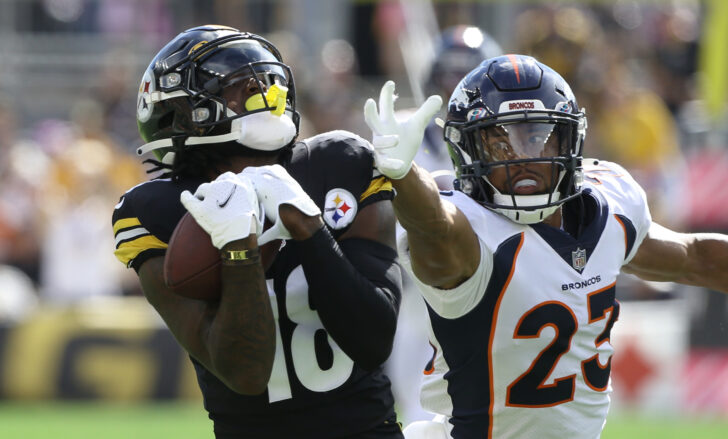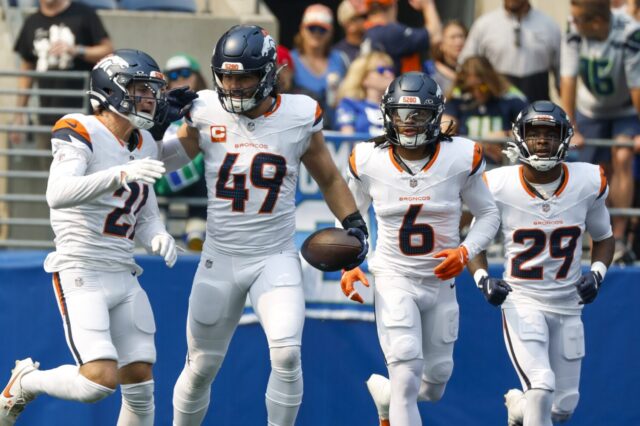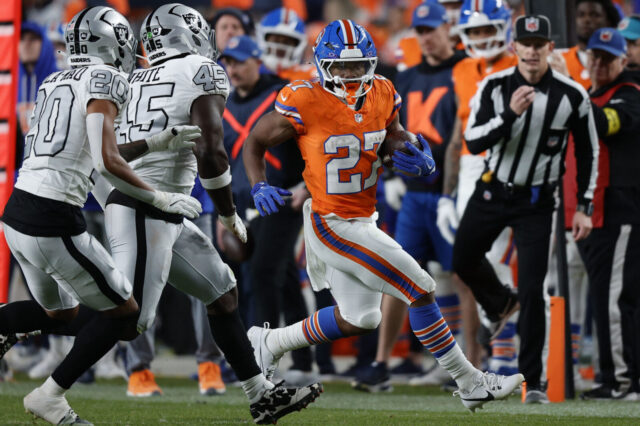After an embarrassing loss to the Baltimore Ravens, the Denver Broncos managed to find a way to suffer an even more demoralizing loss at the hands of the Pittsburgh Steelers.
Where do we go from here and what positives could we possibly salvage from this grisly performance? Let’s look.
Stock Up
Courtland Sutton
The way Courtland Sutton’s game started was so bad, it almost landed him on the other end of this list.
When the Broncos absolutely had to convert a third-and-short, Sutton got open and Teddy Bridgewater found him in stride, only for Sutton to lose sight of the ball and not even make an effort at the reception.
Fortunately, he managed to quickly rebound and then became the MVP of the Broncos’ offense down the stretch.
On the day, Sutton finished with seven receptions for 120 yards and a touchdown.
Beyond the stats though, Sutton became Bridgewater’s go-to target and moved the chains several times as the Broncos attempted to will themselves back to a victory.
Kendall Hinton
How about Hall-of-Fame quarterback Kendall Hinton, huh?
He caught the Broncos’ first touchdown of the game, and in doing so, created the spark that helped ignite the comeback attempt.
He also had a remarkable toe-tapping catch on the sidelines, to keep the Broncos’ comeback hopes alive on the final drive.
After being a non-factor the first couple of weeks in relief of Jerry Jeudy and K.J. Hamler, Hinton had a nice showing today.
Teddy Bridgewater
Bridgewater didn’t necessarily improve his stock this game, but he had to be inserted into this section, as to point out that this loss had almost nothing to do with Bridgewater.
Did he play an excellent, elite game? No, he didn’t.
Was he the problem, or even one of the major problems with the Broncos and their offense in this game? Not even close.
The offensive line was dreadful, Pat Shurmur’s offensive gameplan was laughable and the skill-position players were non-existent through large swaths of the game. Yet still, Bridgewater had the Broncos on the two-yard line with a chance to win the game, while completing over 60 percent of his passes at over 7.5 yards per attempt, and two touchdowns.
That mark is still well-above what 90 percent of Broncos Country believed they were getting out of the quarterback position this season, and he did it seven days removed from a concussion in non-ideal circumstances.
There’s so much finger-pointing that needs to be done after that ghastly performance. Don’t waste any of it on Bridgewater today.
Stock Down
Vic Fangio
What an embarrassing showing from the Broncos and their coaching staff. From top to bottom, the Broncos failed to show up in just about every facet of the game.
The offense looked horribly ill-prepared, but the defense, which is Fangio’s calling card and responsibility, played their worst game of the season. The game plan looked like the defensive coaching staff thought they were still playing Zach Wilson and the New York Jets.
Pittsburgh’s offense is predicated on the run game and Ben Roethlisberger attacking underneath with Diontae Johnson, Chase Claypool and JuJu Smith-Schuster. Denver’s defense typically focuses on taking away the big play, at the expense of the run game and underneath concepts. Schematically, that’s a bad matchup, but it also should have been a relatively easy and obvious adjustment for Denver’s coaching staff to make, considering the high level of versatility and talent on the defense.
Instead, they stayed rigid.
From the jump, they played soft boxes that allowed Najee Harris and the Steelers ground game to start churning, and they never stopped (but more on that later). Not only were they allowing the ground game to churn, but they were allowing the underneath completions, and worst of all, the big plays for the Steelers remained.
As opposed to trying to prey on the glaring weaknesses of Pittsburgh at quarterback and all along the offensive line, Denver decided to sit back and allow the Steelers to dictate the game to their strengths.
There was also an unacceptable amount of stupid, costly penalties.
This columnist has long-defended Vic Fangio and his coaching staff. This performance is entirely indefensible. This defense has more assets invested in it — from money to draft picks — than any other defense in the NFL, and a theoretically great defensive play-caller, and yet they’re nowhere near the asset they should be.
They’re a great defense, but with that amount of capital invested, they need to be elite and they’re not that.
Brandon Staley is a branch of the Fangio tree and his defense in Los Angeles has arguably been more impressive, with far less talent and assets. That success has been, in part, because of a willingness to adapt and adjust his scheme every week to the competition he’s facing. Fangio has not shown that same willingness.
In a division where one of your rivals has rock-solid ownership, coaching and quarterback play; another has elite coaching and quarterback play; the third has high-end quarterbacking; the Broncos feel thoroughly lost without any of the above.
The comeback towards the end of the game was nice, but it was too-little-too-late to erase the ineptitude of the first three quarters.
Kyle Fuller
What an awful game for Kyle Fuller at just about every turn.
Early on in the game, Fuller single-handedly propped up Pittsburgh’s passing game and offense. On Roethlisberger’s first four attempts, he was 0-for-1 when targetting cornerbacks without the last name Fuller. On his other three attempts, he was 3-for-3 for 77 yards and a touchdown.
After gaining nine yards on their first two offensive plays, the Steelers were faced with a three-and-out, but Fuller allowed a relatively easy conversion through the air. Then, on the very next play, Fuller was burned badly deep by Diontae Johnson, despite providing him with quite a bit of cushion.
From that point, the momentum of the game felt irretrievable.
However, the worst moment of Fuller’s game came later on. After the Broncos orchestrated an excellent third-down stop deep in their own territory to force a field goal, their stop was undone by a wholly unnecessary pass interference penalty from Fuller, that gave the Steelers first-and-goal on the one-yard line, and inevitably a touchdown.
That’s a minimum of 11 points that you can place squarely on the head of Fuller.
Run Defense
Denver’s run defense was one of the few bright spots on the entire roster during the embarrassing loss to the Baltimore Ravens, but they completely no-showed against Pittsburgh — who entered the week as the league’s worst rushing attack.
The Steelers were averaging just 55 rushing yards a game entering the matchup, yet they had already eclipsed 70 rushing yards by the time they were a third of the way through their matchup with the Broncos.
When Harris left the game for the Steelers, the run game tailed off quite a bit, but up until that point Pittsburgh had their way on the ground.



